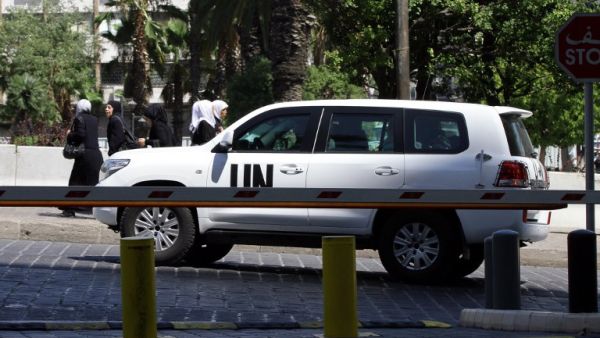A six-car convoy of United Nations inspectors left a Damascus hotel on Monday and headed to the scene of a poison gas attack outside the capital, as Britain said it would be possible to respond to the allegations without unanimous Security Council backing.
The team of chemical weapons experts, dressed in blue U.N. body armour, were accompanied by security forces and an ambulance. They said they were headed to the rebel-held outskirts of Damascus, known as Eastern Ghouta, where activists say rockets loaded with poison gas killed hundreds of people.
"Is it possible to respond to chemical weapons without complete unity on the U.N. Security Council? I would argue yes it is, otherwise it might be impossible to respond to such outrages, such crimes, and I don't think that's an acceptable situation," Hague said on BBC radio.
Britain, has been among the major western governments calling for a strong international response to the alleged chemical attack.
On Sunday, the Damascus government granted the U.N. team access to the site of the alleged attack, but Britain and the U.S. said it was too little, too late.
"The United Nations Security Council ... has not been united on Syria, has not shouldered its responsibilities on Syria, bluntly, otherwise there would have been a better chance of bringing this conflict to an end a long time ago," Hague said.
The U.N. Security Council has been hamstrung by the opposition of veto-wielding members, Russia and China, to any firm action.
"Whatever we do will be in accordance with international law and will be based on legal advice to the national security council and to the cabinet," he added.
The Syrian regime has angrily denied being behind the alleged attack, and has warned the United States of "failure" if it decides to attack the war-torn country.
Washington and its Western allies have pointed the finger of blame at Assad's regime, with French President Francois Hollande saying "everything was consistent" with the conclusion that Damascus was behind the alleged attack.
"The options are open. The only option that I do not envisage is to do nothing," Fabius told Europe 1 radio.
He said the existence of a "chemical massacre" had been established and that Assad was responsible.
"A reaction is needed, that's where we are now... There is a duty to react," he added.
"Leaving unpunished leaders and regimes which resort to such practices undermines the deterrence of the international community. Those who commit war crimes and crimes against humanity must definitely be punished."
Also Monday, senior military officers from Western and Muslim countries were gathering in Jordan to discuss the regional impact of the war in Syria, Jordanian officials said.
State-run Petra news agency quoted a Jordanian military spokesman as saying that the meeting comes at the invitation of Jordan's chief of staff Meshaal Mohamed al-Zaban and General Lloyd Austin, head of Centcom, the US command responsible for 20 countries in the Middle East and Central Asia.
US army chief General Martin Dempsey would take part, as would chiefs of staff from Saudi Arabia, Qatar, Turkey, Britain, France, Germany, Italy and Canada, said the official, cited by Petra.








